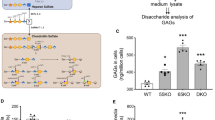Novel aspects of glypican glycobiology (original) (raw)
Abstract
Mutations in glypican genes cause dysmorphic and overgrowth syndromes in men and mice, abnormal development in flies and worms, and defective gastrulation in zebrafish and ascidians. All glypican core proteins share a characteristic pattern of 14 conserved cysteine residues. Upstream from the C-terminal membrane anchorage are 3–4 heparan sulfate attachment sites. Cysteines in glypican-1 can become nitrosylated by nitric oxide in a copper-dependent reaction. When glypican-1 is exposed to ascorbate, nitric oxide is released and participates in deaminative cleavage of heparan sulfate at sites where the glucosamines have a free amino group. This process takes place while glypican-1 recycles via a nonclassical, caveolin-1-associated route. Glypicans are involved in growth factor signalling and transport, e.g. of polyamines. Cargo can be unloaded from heparan sulfate by nitric oxide-dependent degradation. How glypican and its degradation products and the cargo exit from the recycling route is an enigma.
Access this article
Subscribe and save
- Get 10 units per month
- Download Article/Chapter or eBook
- 1 Unit = 1 Article or 1 Chapter
- Cancel anytime Subscribe now
Buy Now
Price excludes VAT (USA)
Tax calculation will be finalised during checkout.
Instant access to the full article PDF.
Similar content being viewed by others
N-Glycosylation
Chapter © 2021

Author information
Authors and Affiliations
- Department of Cell and Molecular Biology, Section for Cell and Matrix Biology, BMC C13, Lund University, 221 84, Lund, Sweden
L.-Å. Fransson, M. Belting, F. Cheng, M. Jönsson, K. Mani & S. Sandgren
Authors
- L.-Å. Fransson
You can also search for this author inPubMed Google Scholar - M. Belting
You can also search for this author inPubMed Google Scholar - F. Cheng
You can also search for this author inPubMed Google Scholar - M. Jönsson
You can also search for this author inPubMed Google Scholar - K. Mani
You can also search for this author inPubMed Google Scholar - S. Sandgren
You can also search for this author inPubMed Google Scholar
Corresponding author
Correspondence toL.-Å. Fransson.
Additional information
Received 27 November 2003; received after revision 8 January 2004; accepted 13 January 2004
Rights and permissions
About this article
Cite this article
Fransson, LÅ., Belting, M., Cheng, F. et al. Novel aspects of glypican glycobiology.CMLS, Cell. Mol. Life Sci. 61, 1016–1024 (2004). https://doi.org/10.1007/s00018-004-3445-0
- Issue Date: April 2004
- DOI: https://doi.org/10.1007/s00018-004-3445-0

